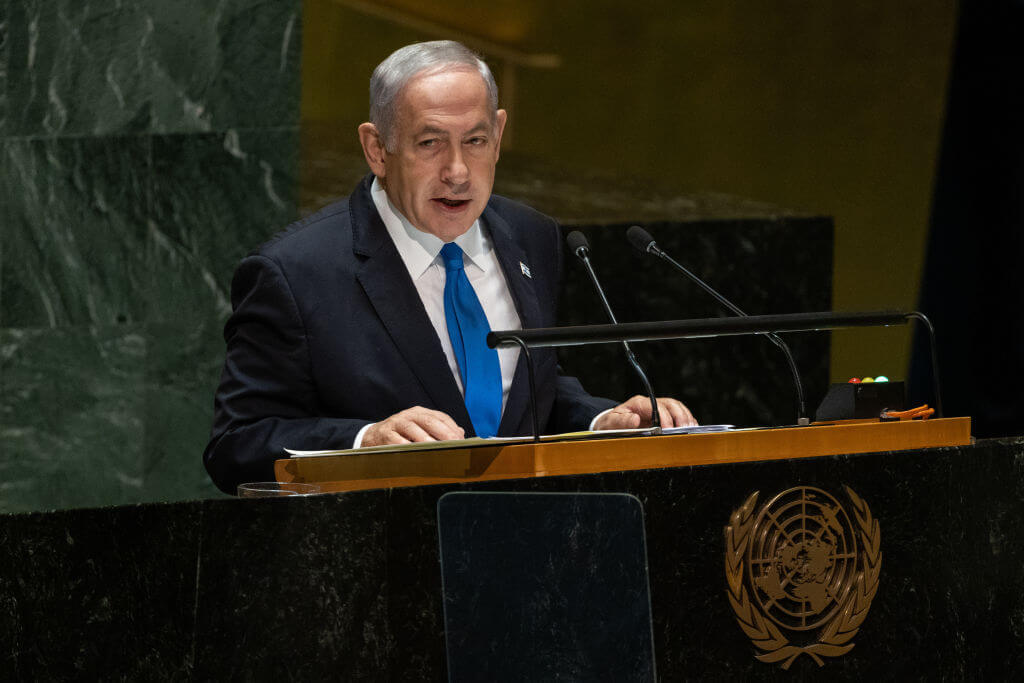Israeli Double-Talk of Peace
Ten years ago I had the honor of being the first Palestinian journalist to interview Israeli Prime Minister Yitzhak Rabin, for the leading daily Al Quds. “Mr. Prime Minister,” I asked him, “what is your vision for the future of the Palestinians in 10 or 15 years?”
“I believe that the future of the Palestinians must be somehow connected with Jordan,” Rabin answered, after a short pause.
He spoke those words in June 1993, while conducting secret negotiations that would shortly lead to the signing of the Oslo accords. Those historic negotiations led to, among other things, the recognition of the Palestine Liberation Organization as the legitimate representative of the Palestinian people and the de facto recognition of the right to determine our own future.
As the intifada enters its fourth year next week, the Israeli dream of peace has been shattered by those who continue to mouth Rabin’s pre-Oslo words. Israel has reverted back to the useless effort of denying Palestinians legitimate leaders, and Israel’s strict and inhumane military occupation has made a mockery of the Palestinian right to self-determination.
The intifada has created a moral and political crisis for Israel. With each round of violence, Israeli leaders try to impose new and harsher repressive measures, with the hope that they can reach that elusive point of deterrence. But every such act raises up Palestinian hopelessness and desperation — rendering ineffective the repressive measures.
Whether it is knocking down eight-story buildings, assassinating militant leaders, further restricting the movement of 3 million Palestinians or building more settlements and walls on Palestinian lands, Palestinians have refused to surrender to Israeli dictates. To date, these Israeli shows of strength have failed to deter Palestinians or crush our political will.
The downward spiral of violence is unlikely to stop until the representatives, thinkers and people of Israel find the answer to one simple, important question: What do they want to do with the people and the land between the Jordan River and the Mediterranean Sea?
Since neither Israelis nor Palestinians have any intention of leaving the land, and are dead set on determining their respective futures, we either need to share the land or the power. Sharing the power, of course, means living in a single, binational state. Most Israelis are opposed to the idea out of demographic concerns, and even Palestinians who used to favor a one-state solution have come to accept its impossibility.
The remaining option, then, is to share the land — two sovereign states. This was the choice legally adopted by the Palestine National Council in 1988 and by Israel under the Oslo accords. But Israeli actions since 1993, especially after Rabin’s assassination in 1995, seem to indicate that the two-state solution has not been completely accepted by the Israeli political establishment — and if it has, then Israeli leaders have not succeeded in translating it into action.
On the contrary, Israeli policies on the ground, especially in the field of expropriating Palestinian land for Jewish settlements, seem to confirm that Israel wants to keep the land without sharing power with the people. Such a policy means that a dual legal order will take hold as the de facto governing system, turning the status of Palestinians in the West Bank and Gaza into something akin to that of blacks in apartheid-era South Africa.
If, on the other hand, Israel really accepts the concept of a two-state solution, then someone in the government better think about the ramifications of the facts currently being built on the ground. The security fence under construction between Israel and the West Bank is essentially a separation wall, notwithstanding Israeli protests to the contrary.
The Palestinian concern is that the security fence, built deep into Palestinian territory, is effectively marking the future borders of an expanded Israel. The 30-foot high cement wall, built more to include Jewish settlements than to protect the State of Israel, does little to assuage Palestinian fears.
While the debate in Israel centers around the minutiae of the security fence, prominent thinkers on both sides of the conflict are calling for a refocusing on final-status issues. Palestinians such as Al Quds University professor Sari Nusseibeh and Israelis such as former Shin Bet chief Ami Ayalon understand that absent a comprehensive framework for peace, the violence will continue unabated.
Nusseibeh and Ayalon issued in April 2003 a peace plan that demarcates a Palestinian state along the 1967 borders. They propose that Jewish settlements be dismantled, and that Palestinian refugees be incorporated into the future Palestinian state. Thousands of Israelis and Palestinians voiced their agreement with the proposal by signing a petition supporting the campaign.
All the peace plans in the world, though, will not bring peace until Israelis and Palestinians are willing to sit down at the negotiating table. The Israeli leadership has made it clear that negotiations cannot begin without a cessation of Palestinian violence. No attempt, though, is made by Israel to realize the duality of the violence, and therefore the need for both parties to cease military activities. Israelis fail to accept that all violence — be it Palestinian suicide bombings or Israeli assassinations — must stop.
Dealing with interim solutions has so far proven to be disastrous, for Palestinians, for Israelis and for the prospects of peace. It is high time for the Israeli establishment to put time and effort into deciding the strategic future of the area.
Daoud Kuttab is director of the Institute of Modern Media at Al Quds University in Ramallah.
A message from our CEO & publisher Rachel Fishman Feddersen

I hope you appreciated this article. Before you go, I’d like to ask you to please support the Forward’s award-winning, nonprofit journalism during this critical time.
We’ve set a goal to raise $260,000 by December 31. That’s an ambitious goal, but one that will give us the resources we need to invest in the high quality news, opinion, analysis and cultural coverage that isn’t available anywhere else.
If you feel inspired to make an impact, now is the time to give something back. Join us as a member at your most generous level.
— Rachel Fishman Feddersen, Publisher and CEO























